Wealth, Whiteness, and
the Matrix of Privilege
Wealth, Whiteness, and
the Matrix of Privilege
The View from the Country Club
Jessica Holden Sherwood

Published by Lexington Books
A division of Rowman & Littlefield Publishers, Inc.
A wholly owned subsidiary of The Rowman & Littlefield Publishing Group, Inc.
4501 Forbes Boulevard, Suite 200, Lanham, Maryland 20706
www.lexingtonbooks.com
Estover Road, Plymouth PL6 7PY, United Kingdom
Copyright 2010 by Lexington Books
All rights reserved. No part of this book may be reproduced in any form or by any electronic or mechanical means, including information storage and retrieval systems, without written permission from the publisher, except by a reviewer who may quote passages in a review.
British Library Cataloguing in Publication Information Available
Library of Congress Cataloging-in-Publication Data
Sherwood, Jessica Holden, 1972
Wealth, whiteness, and the matrix of privilege : the view from the country club / Jessica Holden Sherwood.
p. cm.
Includes bibliographical references and index.
ISBN 978-0-7391-3412-2 (cloth : alk. paper) ISBN 978-0-7391-3414-6 (electronic)
1. ClubsMembership. 2. ClubsSocial aspects. 3. Women. 4. Race. 5. Equality. I. Title.
HS2519.S54 2010
367dc22
2010025182
 The paper used in this publication meets the minimum requirements of American National Standard for Information SciencesPermanence of Paper for Printed Library Materials, ANSI/NISO Z39.48-1992. Printed in the United States of America
The paper used in this publication meets the minimum requirements of American National Standard for Information SciencesPermanence of Paper for Printed Library Materials, ANSI/NISO Z39.48-1992. Printed in the United States of America
For Jesse, still and always.
Contents
List of Tables
Acknowledgments
This project would not have been possible without the participation of the interviewees. I thank them all for inviting me into their homes and offices, giving willingly of their time and thoughts. I appreciate those who opened their address books to refer me to other club members, and especially the important early contacts whose endorsement of my research smoothed the way to securing more interviews. Im grateful.
An interviewee who reads this book might be surprised by how critical it is. Ill borrow here from Julie Bettie, who also wrote a critical book about people she liked. As Bettie writes in her Acknowledgments, my analysis is not meant to be critical of individual people, but of the social systems, processes, and ideologies present in our culture that recruit individual actors and inform their actions.
It has been a long road from those interviews to the publication of this book, but at least it hasnt been lonely. I am grateful to all of these people for giving me some company along the way: Maitrayee Bhattacharyya, Woody Doane, Corey Dolgon, G. William Domhoff, Heather Johnson, Helen Mederer, and Barb Silver. I also acknowledge fondly all the 20062010 leaders in Sociologists for Women in Society. I have learned so much working in SWS. I also feel fortunate to have worked in the executive office with Candace Hindle, Kristen Baxter, Theta Pavis, Rachel Weisz-Smith, and Donna Russo Morin.
Many thanks to Michael Sisskin at Lexington Books for accepting this project and working with me to bring it to completion.
Molly Lang and I have been friends throughout graduate school and beyond. It is still wonderful to talk with her as we both work to combine motherhood with sociology careers.
In addition to Mollys friendship, I was buoyed through graduate school by my mentor Barbara Risman. I have learned much from Barbaras example of living ones principles, including putting social capital processes to feminist use. I thank her for wisely chairing my dissertation committee, and also thank committee members Richard Della Fave, Amy Halberstadt, Michael Schwalbe, Don Tomaskovic-Devey, and Susan Ostrander. Im grateful for Susans generosity in adopting me and my dissertation, despite the distance between our departments.
Im pleased to thank my mother for both scholarly and personal reasons. A longtime resident of the Heightsgoing unnamed hereshe was an invaluable informant. Our regular conversations helped me a lot in conducting interviews. When I had a baby during dissertation writing, her loving care of the infant Abigail allowed me to keep going. Our family is very indebted to Grandma.
By now, Abigail is eight and her sister Ellie is six. I am grateful that they understand the importance of my work and are proud of me. Of course I am so proud of them.
My partner in parenting and so much more is my husband, Jesse. I know that this road has seemed interminable, and Jesse has my apologies and appreciation. I am grateful to the point of awe for his patience and caretaking. Jesse has been my best company on lifes road, and I am pleased to dedicate this book to him with all my love.
NOTE
. Bettie, Women Without Class: Girls, Race, and Identity. Berkeley: University of California Press, 2003, page x.
Introduction
Growing up, my heritage felt lopsided. I seemed always to know that my mother was the grandchild of Jewish immigrants from Russia. My fathers side of the family, by contrast, seemed generic and colorless. I now recognize that mistaking oneself for a generic, blank, default group is a sure sign of belonging to a privileged unmarked group.
When, as a child, I asked my father to identify his ethnic heritage, he said something indistinct about being a mixture of English, French, and other, and taught me the acronym WASP. White Anglo Saxon Protestant. So then I embraced being half Jewish, half WASP. When I consider what led me to this particular research study, part of the answer rests in that identity I grew up with and its feelings of partial belonging. I confess to Gatsbyesque mixed feelings toward WASP life, being both repelled and attracted like a confused magnet.
I grew up with class privilege as well as white privilege. Being unmarked/superordinate on both statuses kept them both invisible to me. Ive gotten benefits from my social location, like the people in this book; but as well see, this dual privilege is a detriment when it comes to recognizing and understanding inequalities.
As a graduate student in sociology, I concentrated in the area of class, race, and gender inequalities. With my classmates I learned about the perspectives and challenges of poor people, people of color, and women. But I was compelled by the occasional reminder to study up, and remember the unmarked sides of those hierarchies too. I was a preppy WASP, at least in part, so I thought it made sense to tackle the study of other privileged people.
I got underway gathering data: I interviewed members of the most exclusive country clubs in one area of the northeastern United States. These interviews were surprisingly pleasantI was braced for the possibility of hostilityand I visited some wonderful homes and offices in the process.
As I analyzed my completed interviews, a controversy erupted in the news. The New York Times anticipated it by asking in 2001, Why dont men and women play golf together?
In 2002, there was protest that golfs top tournament, the Masters, was to be played at a golf club that admitted no women. This protest about a golf tournament drew attention to all-male clubs just as a similar protest in 1990 drew attention to all-white clubs. The New York Times announced that Some Golf Clubs Are Still a Mans World; the article considered whether golfersespecially the nonwhite Tiger Woodshad an obligation to protest the tournaments location, and it noted the debate over Which Private Clubs Are Acceptable. And Private.
Next page

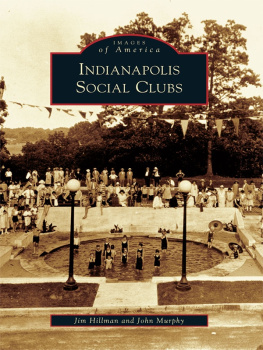
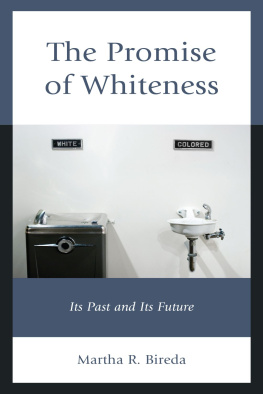

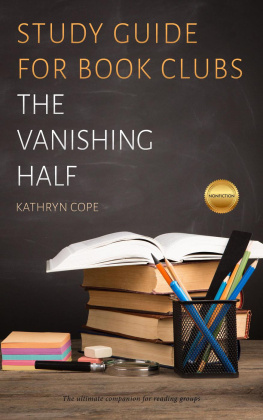



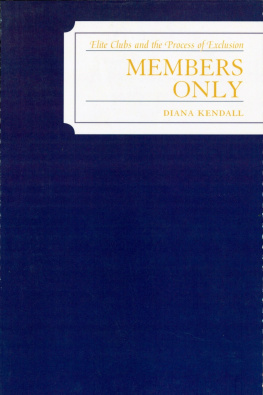

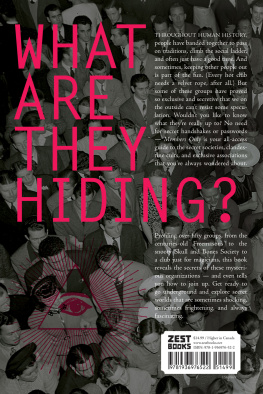

 The paper used in this publication meets the minimum requirements of American National Standard for Information SciencesPermanence of Paper for Printed Library Materials, ANSI/NISO Z39.48-1992. Printed in the United States of America
The paper used in this publication meets the minimum requirements of American National Standard for Information SciencesPermanence of Paper for Printed Library Materials, ANSI/NISO Z39.48-1992. Printed in the United States of America